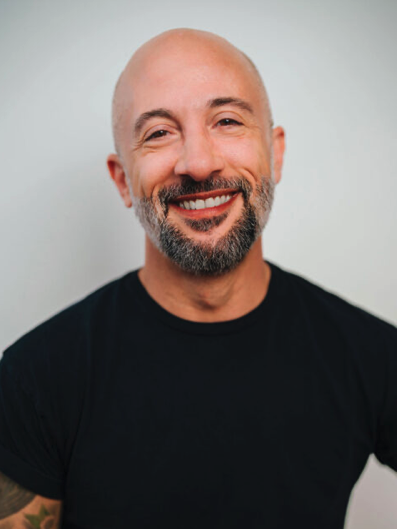By Robert St. Martin
Included in the lineup of films at this year’s Frameline 48 Film Festival in San Francisco is Desire Lines, winner of the NEXT Special Jury Award at Sundance. Desire Lines, directed by Jules Rosskam, is a revolutionary declaration of following one’s authentic desire for present-day transmasc folks in this intimate doc-fiction hybrid film.

Ahmad, an Iranian American transgender man named Ahmad (Aden Hakimi), explores his gay desires as he travels back and forth in time from a queer archive in the present with Kieran (played by Theo Germaine from Showtime’s Work in Progress). The queer archive is filled with photos and accounts of transmasc transgender people who discovered that they prefer sex with cis men, especially cis gay men. In other words, being a transmale but still having a vagina leaves one with the question: “Can a vagina be masculine?”
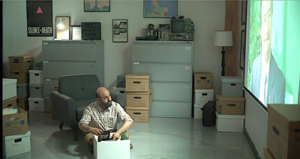
This fictional queer archive where Kieran works and where Ahmad comes to do research on the history of transmasc individuals is seemingly housed in what was formerly a gay bathhouse that has been renovated into an office building. The film incorporates the stories of transmasculine people to consider an overlooked element of the relationship between transness and queerness. Desire Lines tells the stories of men who discover that they are gay after transitioning.
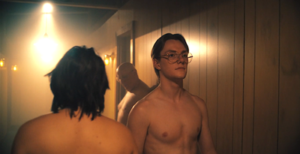
The film opens in what appears to be a gay bathroom from the 1980s before the AIDS crisis hit. We hear Sylvester’s iconic song “You Make Me Feel Mighty Real” playing in the background as men and transmasc men wander through the dimly lit corridors and we peak into rooms where sexual activity is going on. “I feel real when you touch me. I feel real when you kiss me. I feel real when you want me.” Ahmad, Kieran, and other characters strip down, towel up, and go cruising. Rosskam says the interplay between the archives and the bathhouse was inspired by his interviews.
Desire Lines also asks the pointed question if someone’s genitals or their heart ultimately govern the laws of attraction for people straight, gay, or anything in between. “It’s a film I’ve been thinking about making for 20 years, and that emerged from watching this phenomenon among transmen: So many of us seem to develop attraction for other men after coming out as trans,” observes director Rosskam. “It’s something I witnessed in community for the last 20 years and have been fascinated by, especially because it doesn’t seem to happen at the same rate or frequency with transwomen.”
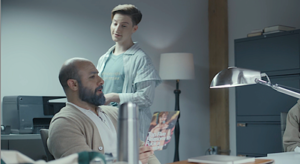
Iranian American transman Ahmad (Aden Hakimi) visits this fictional LGBTQ+ archive. While researching stories of transmen, Ahmad finds himself drawn to the younger transmasculine archivist Kieran (Theo Germaine). There seems to be some immediate chemistry between Ahmad and Kiernan although they keep their distance.
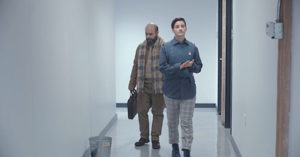
Cut between these scenes, however, are interviews with other transmen that root the fictional story in real perspectives from the present-day. They talk openly and frankly about their experiences of sex with cis gay men. These illuminating and occasionally humorous stories run the gamut from PrEP to fetishization, from Grindr to sex work, from racialized sexuality to fisting.
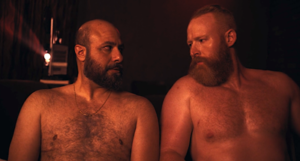
In the archive, moreover, Kieran introduces Aden to the story of Lou Sullivan, an American writer who was the first transgender man to come out publicly as gay. Sullivan’s story piques Ahmad’s interest. He sees in Lou a mentor he never had, and he immediately identifies with his sense of longing. Archival interviews show Sullivan reflecting on what it means to affirm one’s gender and have a new realization of the heart. The film incorporates several interviews done by a psychologist with Sullivan who recounts his own experiences on old VHS tapes from the archive. In the late-1980s, Sullivan contracted HIV and sadly died from AIDS in 1991,
Meanwhile, Rosskam offers excerpts of Sullivan’s diaries in voiceover as Ahmad pores through the archives. Sullivan’s account provocatively deconstructs the lens of heteronormativity with which trans stories are too often told in movies in which gender transition “corrects,” so to speak, a person’s relationship to his body and his desires.
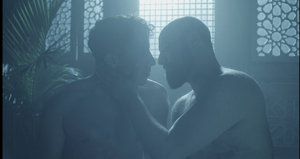
Rosskam says that his own experience of encountering Sullivan’s story proved an awakening. “As a youngish transmasculine person at the time, I was like, ‘Oh my God. There are other transmasculine people. I was just so blown away that he existed at the time that he did. It was hard enough in the early 2000s and still is now to exist as a transperson but think about him the ’70s and ’80s and existing in a gay male world,” says Rosskam. “I genuinely feel like I wouldn’t exist if he didn’t exist.”
Rosskam says the stories in Desire Lines push against the prevailing perception about trans lives and loves. “Part of what Lou was fighting against was this notion. He was literally told, ‘If you want to have sex with men, just stay a woman,’ as if those are the same thing. It’s like there’s this conflation around gender and sexuality,” Rosskam notes.
Desire Lines screens at the New Parkway Theatre in Oakland on June 22 at 6:00 PM. New Parkway is located at 472 24th Street in Oakland. Having sold out, there are still rush tickets available. If you miss the chance to see the film, you can visit it later online via the Frameline Digital Screening Room, beginning June 24.


